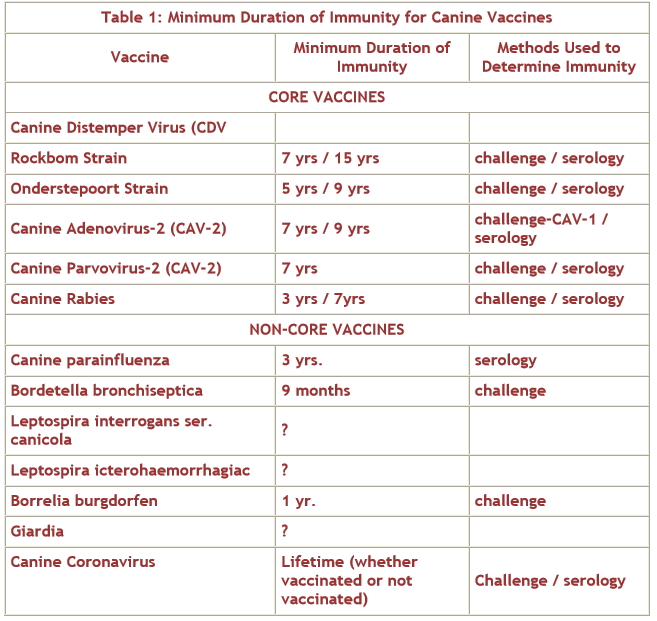At What Age Should Puppies Be Vaccinated?

Dogs should not be vaccinated at too young an age – if given vaccinations whilst they are still protected by their maternally derived antibodies, these will fight against the vaccinations and the puppy will not be covered, at the same time reducing the level of antibodies in the puppy. A study was performed in 2014 assessing amongst other things the impact of vaccinations on MDA – see http://www.sciencedirect.com/science/article/pii/S1879437814000138
The current practice of giving 2 or 3 vaccines at 8/9 weeks and then again at about 12 weeks is more likely to put the puppy at risk of disease during weeks 8-12. The reason two injections are given is that the vet won’t know when the MDAs become low enough for the vaccinations to be effective, so they keep vaccinating every few weeks in the hope that they catch the window when the MDA is low enough for the vaccine to be effective, but at the same time the puppy has not yet come into contact with the disease. A preferable approach is to wait until the puppy is 14-16 weeks old and then give a single dose of vaccine – and then to titre test 2 weeks later so see if the puppy has antibodies to the main diseases. If not, then revaccinate, otherwise there is no need for a second injection. Indeed, noted veterinary immunologist Dr Ronald Schultz recommends a minimum vaccine programme that includes one vaccination for parvo, distemper and adenovirus (hepatitis) only, given at 16 weeks of age.
(Various other studies have been performed – Pfizer performed a field study in 1996 which demonstrated that 100% of puppies receiving a single vaccination at 12 weeks were protected, whilst only 94% of puppies vaccinated first at 8—10 weeks and then again at 12 weeks were protected. Vanguard has also tested the response to Parvovirus in their combination vaccine – at 6 weeks only 52% of puppies were protected, at 9 weeks 88% of the puppies were protected, at 12 weeks 100% of the puppies were protected.)
Vaccines suppress the puppy’s immune system for 10 days, which is why owners are told that the vaccinations take at least a week to work – and during this time the puppy is even more at risk than if he didn’t have the vaccinations.
Puppies should not be vaccinated when they are stressed (or have any form of illness – the inserts on the vaccinations state that only healthy dogs should be vaccinated). The first few days in a new home, and the first visit to the vet, are likely to be stressful, so the puppy should have a friendly health check at this time, and then return for vaccinations at a later date, once he’s settled in with his family.
Whilst vaccinations for viral diseases can create immunity in the puppy, vaccines for bacterial diseases (e.g. Lepto, Kennel Cough) do not create immunity - instead if the dog catches the disease then vaccinations will reduce the symptoms.
How Often Should I Then Vaccinate?
The WSAVA and the BSAVA state that the core viral vaccinations only need to be given every 3 years as they have been proven to be effective for this length of time (bacterial vaccinations are still yearly). Dr Ronald Schultz published a paper in the mid 1970’s that demonstrates duration of immunity:

Note that you can’t actually boost immunity – an animal is either immune or not. The purpose of giving further vaccinations is in case the initial vaccinations did not work for some reason. However, it is now much more accepted to titre test to see if a dog is immune, and only vaccinate if titre levels are zero. In June 2016 the Chartered Institute of Environmental Health (CIEH) published their Model Licence Conditions (MLCs) for kennels stating that titres should be acceptable instead of requiring regular vaccinations. DEFRA have subsequently published a consultation document, which includes these latest MLCs.
